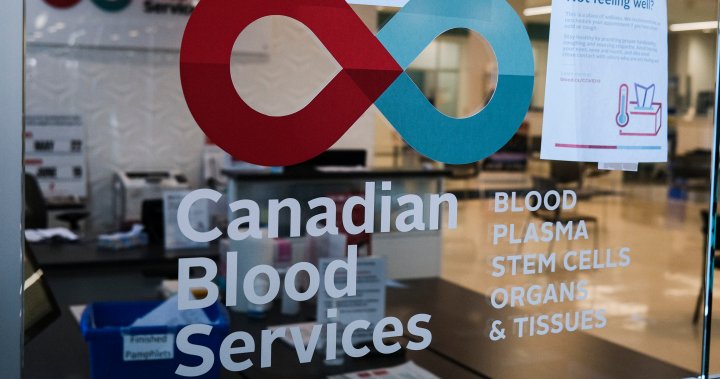A “perfect storm” is impacting Canadian Blood Services’ supply, leading to an urgent plea for donations as summer begins to wrap up.
Ron Vezina, vice-president of public affairs with the non-profit organization, told Global News Wednesday the lingering effects of the COVID-19 pandemic, extreme weather and more Canadians travelling abroad have left a hole of 10,000 donation appointments within the network.
“It feels like the perfect storm of storms,” he said.
“All these things add up to a much-reduced impact in terms of blood inventory.”

Summer, Vezina noted, is typically a slower season for blood donations given that many Canadians seek to take time away from their schedules to enjoy time off.
However, Canadian Blood Services entered this summer in a “weaker position than we have in the past,” Vezina said, and the extreme weather has made it more challenging to beef up supplies.
“The most recent Kelowna (B.C.) fires, we lost at least 300 collections of whole blood. We also lost a couple of days of collection at our plasma site,” he said.
“Over the next several weeks, it’s a pretty critical period where we need people to step up and join.”

This summer has been punctuated by wildfires that have torched 15 million hectares of land so far, according to the Canadian Interagency Forest Fire Centre.
Most recently, attention has been fixated on wildfires burning in British Columbia and the Northwest Territories.
B.C. officials said Monday the number of properties around the Central Okanagan destroyed or suffering significant wildfire damage has increased to 189, up from 181, as the region in British Columbia’s southern Interior moves from response to recovery.
West Kelowna fire Chief Jason Brolund has told a briefing that the destructive McDougall Creek fire is still burning out of control, but the battle against the blaze is now in the hills above the community, “not in the streets and neighbourhoods.”

Meanwhile, in the Northwest Territories, the region is preparing for tens of thousands of people to return home after a much-needed win in the battle against a blaze that was threatening Yellowknife.
The status of a wildfire located 17 kilometres from the city’s edge was changed to “held” Monday after a weekend of cooler temperatures and a small amount of rain helped firefighting efforts.
Yellowknife officials said while the development is a major turn in the fight, it’s not safe yet for people to come back to the territorial capital.
Furthermore, members of the legislature unanimously voted Monday to delay an election scheduled for October because of wildfires. The new date for the N.W.T. election will be Nov. 14.

Vezina said extreme weather events have resulted in some staff being unavailable to carry out appointments, and/or donors not being able to make it due to their own safety.
That, including the lingering effects of the COVID-19 pandemic, where Canadian Blood Services saw a drop in donations as the virus spread, has led the organization to put out a plea for help filling 10,000 appointments as soon as possible.
“To get us over this hump, we’re hopeful that in the fall with people getting back to their routines, back to school, back to campus, back to the workplaces that we’ll see a lot better pickup in terms of our participation,” he said.
“We also know that we need about two appointments to get one collection. Only about 50 per cent of our appointments result in a collection. People change their plans, things happen, we understand that, but it just means that we have to work extra hard. Two appointments to one collection is a pretty high ratio.”

Vezina added that giving blood is not a time-consuming activity either.
“In about an hour, you could save a life,” he said.
“We all have to look inwards and say, ‘If I am able, if I’m eligible, now’s the time to hear that call.’ If you’ve been thinking about it for a while … now’s the time to turn those good intentions into actual action.”
— with files from The Canadian Press
© 2023 Global News, a division of Corus Entertainment Inc.




